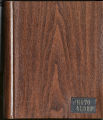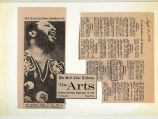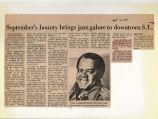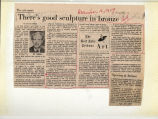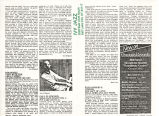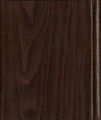| OCR Text |
Show BACK ISSUES. MISSED ONE? K-5»-. hmrf kwe-Chkl Cocei Bob Moog Bela S~>'it)i, \1j» Wwjrh CliHon Chenier. B VfTb: SI-50 k-t>1: YUdim" Horowitz, Marian Me Panland. Roger Pcmeil VU Hopkins, Horace Silver. k-63: Rkk Wakeman, Tedd> Wilson. Charles Rosen, Mow Allison. Income Tax Tips. K-65: Keith Jarrett, Big Band Pianists. Kerr\ Minnear. Ronnie Milsap, Phineas Newborn. K-67: Gregg Allman, George Shearing. Jan Hammer. Alexis VNeissenberg. Sleinway. K-69: McCoy Tyner, Tony Banks, Jack McDuff, Chuck Leavell. Pipe Organ History. An Tatum. K-611: Edgar Winter, Virgil Fox. Billy Taylor, New Keyboard Designs. Patrice Rushen, Jefferson Starship Keyboardists. B£ 1977: $1.50 K-71: Ramsey Lewis, Peter Nero, Gregg Rolie, Misha Dichter On Basic Principles. K-72: Billy Preston, Groove Holmes. Music Of Scriabin. Cedar Walton, Toshiko Akiyoshi. K-73: Bill Evans, Floyd Cramer, Misha Dichter, Larry Fast. Transcription of "Ain't Misbehavin'." K-74: Brian Auger, John Lewis, Anthony Newman, Tom Waits. Avant-Garde Piano. K-75: Daryl Dragon, Paul Bley, Aldo Ciccolini, Tom Oberheim, Hand & Arm Movement. K-76: Vladimir Ashkenazy, Ahmad Jamal. Al Kooper, Piano Care, Build A Keyboard Mixer. K-77: George Duke, Count Baste, Prepared Piano Part I, "Pig" Robbins, Hand Independence, Beach Boys Keyboardists. K-78: Isao Tomita, Prepared Piano II. Eubie Blake. Natalie Hinderas. Livgren & Walsh Of Kansas. K-79: Josef Zawinul, Ray Manzarek. Clementi/Cramer/ Czerny, Del Wood, James P. Johnson. K-710: KEITH EMERSON SPECIAL (Interview, Equipment, Music), Mary Lou Williams. Lazar Berman, Michel Legrand, Theatre Organ History. K-711: Herbie Hancock, Earl Hines, Garrick Ohlsson. Manfred Mann, Harold Rhodes, Richard Tee. K-712: Dave Brubeck, Andre Watts, John Paul Jones, Tom Coster, Eddie Palmieri. Pop Organ Blues. SP 1978: $1.50 K-81: Liberace, Jaki Byard. Igor Kipnis. David Palmer of Jethro Tull. K-82: Chick Corea, Star Wars sounds. Finger Exercises, Corea Piano Piece. Steve Alien, Cory Lerios. K-83: Oscar Peterson, Piano Competitions. Robin Lum- ley, Brian Jackson. Sunnyland Slim. K-84: Van Cliburn, Polyphonic Synthesizers Part I, Lonnie Liston Smith. Jean-Michel Jarre. Roger Kellaway. K-85: Gary Wright, Rosalyn Tureck, Roland Hanna. Muhal Richard Abrams. Fundamentals of Fingering. K-86: Randy Newman, Lonnie Jordan, Ruth Laredo, Sam Rivers. Electronic Music Schools. K-87: Tony Banks, Ciaudio Arrau, Effects Devices. Joachim Kuhn. Gary Brooker. Jimmy Rowles. K-88: Jimmy Smith, Henry Mancini, Tedd Joselson, Adviiui, Board's "Greensleeves" Variations, Tube-, krvboardists. K-39: Les McCann, Philippe Entremont. Digital Synthi-Mv. Bernie Worrell, Art Van Damme, Supertramp Kevboardists. K-810: Jan Hammer. Ursula Oppens. Ran Blake. Bobby Shon. Playing Inside The Piano. K-811: DUKE ELLINGTON SPECIAL (Bio, Music, Photos), Polyphonic Swithoweis II. Jean-Phillippe Collard, Alan Price. Barry Miles. K-812: Richard Tandy. Sun Ra, Gary Graftman. Paul Smith's Jazz Exercises. Walter Bishop Jr. S= 1979: $1.50 K-91: Cecil Taylor, Bill Payne. Ragtime. Dick Hyman Piano Piece. Michael Hoenig. K-92: Rick Wakeman. Ftlecis Devices Pan I. Carla Bley, Leonard Pennario. Red Garland, Bill Irwin Arrangement, Jelly Roll Morton. K-93: Virgil Fox, Eddie Jobson, Steve Kuhn. An Hodes, Early Pianos. Rhodes Modification. K-94: Dave Grusin, Victor Borge, Randy Weston, Al Greenwood. Alicia de Larrocha, Effects Devices II. K-95: Dr. John, Dick Hyman, George Cables. Toto Keyboardist, Basics, Ot Musical Analysis. K-96: Suzanne Ciani, Stanley Cowell, Bosendorfer. Effects Devices III. Steve Reich, Do-lt-Yourself Maintenance. K-97: Robert Lamm. Denny Zeitlin. Lorin Hollander, Making Your Ov\n IP, Synthesizer Glossary, Hampton Hawes K-98: Mike McDonald, Joe Sample, Barbara Carroll, Andrae Crouch. Music Of Messiaen. K-99: Keith Jarrett, Jarrott Solo Transcription, Duncan Macka\ Richard Morris. Mike Nock. Synthesizer Terhnk lan John Vieira. K-910: George Duke. Seth fustman. Abbey Simon, Adam Makowicz. Musical Intimidation Game. K-911: Joe & Gino Vannelli, Joanne Brackeen. Paul Jacobs. Mike Lang. Stan Kenton, Prophet Designer Dave Smith. K-912: Wendy Carlos, Hank Jones. Bob Andrews, "King Wenceslas" Variations. 6 1980: $1.75 K-01: Booker T., Da\e Stew an. Apocalypse Now Soundtrack, Paul Badura-Skoda. Cocktail Piano In N.Y. K-02: Peter Nero, Blue Oyster Cult, Ronnie Foster, Amplification Basics. Emanuel Ax. Dance Class Piano. K-03: Jimmy Destri, Passport Keyboardists, Philip Glass. Patch Cords. Artie kjne. Jazz Exercise. K-04: Keyboards In The Movies, Greg Hawkes, Fernando Vaienti, Michael Boddirker. Jeff Lorber. K-05: Larry Fast, Dollar Brand. Marilyn Mason, David Carr Glover, Accordion History. K-06: Bill Evans. "Peace Piece." Frank Zappa & His Keyboardists, Promote \our Career. Joseph Kalichstein. K-07: Roger Powell Rcud.e Roundtable. Juilliard & Eastman, Ralph Grterson. Bili Irwin. Art Tatum's Style. K-08: Glenn Gould, lobs Pan One-Las Vegas. Gary Numan, La Monte Youne foe Turner. K-09: Keith Emerson, Garrick Ohlsson. Tete Montoiiu, Jobs Pan Two - Pano Teaching, Fifth Anniversary History & Excerpts I definitely don't want to miss any! I've enclosed S. money order) plus $1.00 for postage and handling. Please send to: (check or Name, Address . City____ State_ (Please indicate seiection according to code#.) -----Zip. Options: Options in case your first choices are sold out. Mail to: Contemporary Keyboard Back Issues, 20605 Lazaneo, CupertirKj, CA 95014 Please allow up to 8 weeks for delivery. K10 LETTERS are and using this as a springboard for his theory on the differences between "vertical (jazz) music" and "horizontal (European) music." Ell-ingson's letter provoked several heated responses in the March '80 issue, which in turn were answered by Ellingson with another letter in June '80. That letter moved two more irate readers to write in the August '80 column. With this issue. Round Three begins. In two months the results of the 1980 Poll will be announced. We are all bracing ourselves for '81.] The issue is not Oscar Peterson; he is merely a symptom of the deeper problem of scholarship. The letters of Steve Worley and Art Hillery [see CK, Aug. '80] are typical of how weak the jazz mentality is, how unable it is to defend itself, how irrational and fatally anti-intellectual it has been. You may think jazz is doing well in America. Take a closer look. Notice how it struggles for understanding, struggles for financial support, struggles in the cold war against the classical establishment in the schools. And do you hear much jazz on the radio these days? No. Check the broadcasting yearbook and see the pitifully small number of hours given to jazz programming across the country. For two years I taught jazz piano at Brigham Young University, so I know how scared the classical players are and how hard they fight in their last-ditch attempt to keep lead sheets out of the classrooms. And please don't tell me that jazz is "moods and emotions." I listen with my brain, not my stomach. None of the tin ears of my critics will be able to help America's art form survive in a musical jungle of money and lost integrity. The public is terribly confused about what to expect from jazz, and who can blame them, with so little guidance from players like Herbie Hancock and Chick Corea, who used their jazz reputations to turn around and decide that making money was more fun than making music? Duke Ellington to his death cared only about the music, and many of today's musicians could stand to emulate Duke's integrity. Only historical perspective and hard analysis will save jazz from oblivion. Only when educators know the real difference between the music of voices and the music of mechanical instruments will they win the battle. Only when jazz stops accommodating the Europeans who would like to see jazz stay at the gut level, disguising the real intellectual history that is there if the jazz mentality would only look at it and stop playing politics and saying with Worley and Hillery, "Go man go, all you crazy cats," or, with Chuck Mangi-one, "It feels so good" - only then will jazz be rescued. Contemporary music desperately needs defenders who can teach the real music, along with musicians with integrity who can play it. We've had enough of the jam session view that insists, "Just blow, man, ya know; who cares what the chord is?" The "realities," Mr. Worley, are that jazz may never have the attention it deserves, because your kind of attitude will forever keep the music bottled up in the heads of a few great players who are themselves guilty of this anti-intellectualism. Serious improvisation must have a strong sense of vertical polyto-nal composition, and this should be taught like mathematics or any other discipline. So all you "mood" listeners, keep it up and you'll destroy jazz. Paul Ellingson Salt LakeTjfyTOT m CONTEMPORARY KEYBOARD/OCTOBER 1980 |

